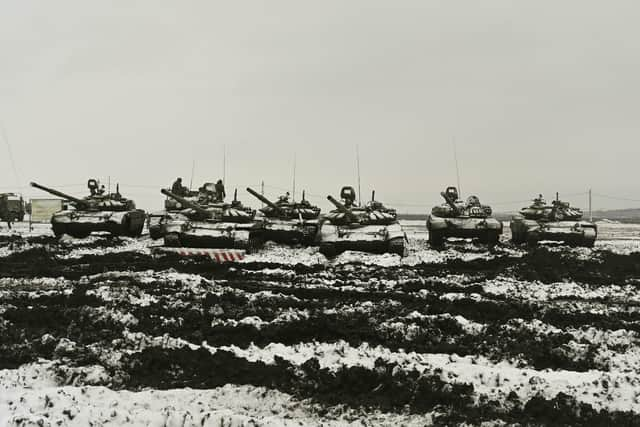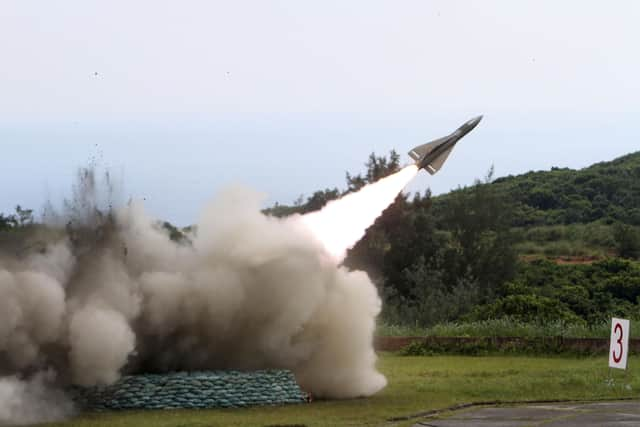Esmond Birnie: Things could get worse globally with one or even two wars that have a major economic impact on UK, including Northern Ireland


Black swans, events which might seem improbable but have massive consequences, sometimes fly over in flocks.
In the relatively short interval 2008-2021 we had the global banking crisis, Brexit+Protocol and then Covid. World events have major impacts on the UK including Northern Ireland (NI), and especially on our economy.
Advertisement
Hide AdAdvertisement
Hide AdSo, what’s the worst that could happen to the global and hence NI economy over the course of 2022?


It could, alas, be one or even two major wars.
A major source of uncertainty in the world economy has always been geopolitics — in the last five or so years particularly relating to North Korea and Iran.
In 2022 it could be either or both a crisis relating to Taiwan as China escalates its threats to “take back” that territory or the Ukraine where there could be an outright invasion from Russia.
• Economic consequences of wars


Escalation to full scale war is not inevitable. There is a lot of bluff and brinkmanship going on but the probability of something going badly wrong is reasonably high.
Advertisement
Hide AdAdvertisement
Hide AdAt the moment, the Russian tanks may being held back as much by the muddy soils of eastern Europe as the ongoing diplomacy between Russia and the USA.
Invasions of the Ukraine or Taiwan would probably not lead to direct conflict between Russia/China and the Western countries (including the UK and US), although expect conflict through proxies, but the economic consequences would still be dire:
Increased uncertainly leading to business investment declines which would probably put paid to the post-Covid economic recovery.
Great instability in the foreign exchange markets — particularly relating to the American Dollar and Japanese Yen — which would also be bad for trade and business generally.
Advertisement
Hide AdAdvertisement
Hide AdExpect Russia to be frozen out of the global banking system alongside severe trade and technology sanctions (the same might be attempted in the case of China but would be harder to apply).
Northern Ireland’s dependence on Russia/China as a trade market or source of inward investment remains small: in 2021 the number of employees in Chinese owned firms (including Hong Kong origin) was about 750 though this was an increase on 2010, and NI exports to China in 2017 were £159m [see Note below].
Chinese tourists coming to the West (including NI) would probably decline. There would be a question mark about the reliance of some Western universities on the revenues earned from Chinese students.
Russian gas supplies to Western Europe would stop. So, on top of all the recent energy price spikes, yet another large increase.
Advertisement
Hide AdAdvertisement
Hide AdIf fighting breaks out in the South China Sea expect extreme uncertainty regarding world oil supplies. Global prices would rise dramatically.
Uncertainty regarding Taiwan, a major source of electronic supplies, was already impacting on world semiconductor prices in 2020 and 2021. Expect a further increase with consequent severe implications for the price of cars (new and second hand).
The response to Covid probably represented a semi-permanent shift towards a rather higher tax and spend economy.
After the Berlin Wall and Soviet Union collapsed 30 years ago there was the optimistic view that we could get by with defence spending levels of 2% or less of GDP. Major wars in 2022 suggest that view is no longer tenable. Countries like the UK will probably have to spend a great deal more on defence.
Advertisement
Hide AdAdvertisement
Hide AdFor some of NI’s manufacturing and IT firms that creates extra demand but it does represent more pain for the taxpayer.
Multilateral approaches to global problems, notably climate change, are going to become much harder to realise.
I appreciate analysis such as this may been rather pessimistic but perhaps it is realistic. The experience of the last 15 years suggest black swans are not once in a century events. They come along with rather greater frequency.
And, like it or not, the NI economy and hence our politics does tend to be driven to and forth by great events at the world level.
Advertisement
Hide AdAdvertisement
Hide Ad• Dr Esmond Birnie, Senior Economist Ulster University Business School
• Note. The main official data source for country of ownership of employment is the Inter-Departmental Business Register (most recent, June 2021). In 2010 21,270 people in NI were employed in USA owned firms but zero in Chinese. In 2020 115 were employed in Hong Kong owned businesses. In 2019 485 were employed in Chinese owned. The 2017 trade data was published by the China Daily News, 17 June 2019.
——— ———
A message from the Editor:
Thank you for reading this story on our website. While I have your attention, I also have an important request to make of you.
With the coronavirus lockdowns having had a major impact on many of our advertisers — and consequently the revenue we receive — we are more reliant than ever on you taking out a digital subscription.
Advertisement
Hide AdAdvertisement
Hide AdSubscribe to newsletter.co.uk and enjoy unlimited access to the best Northern Ireland and UK news and information online and on our app. With a digital subscription, you can read more than 5 articles, see fewer ads, enjoy faster load times, and get access to exclusive newsletters and content.
Visit
now to sign up.
Our journalism costs money and we rely on advertising, print and digital revenues to help to support them. By supporting us, we are able to support you in providing trusted, fact-checked content for this website.
Ben Lowry, Editor